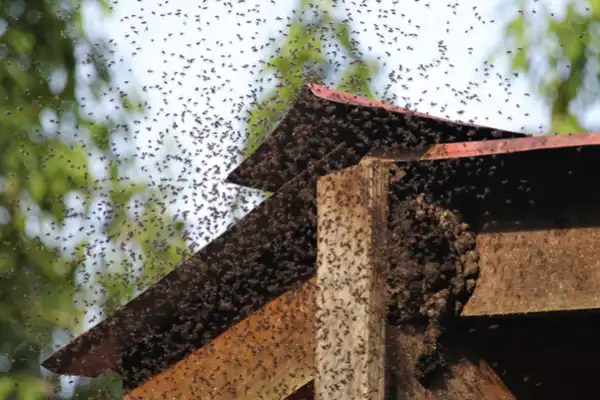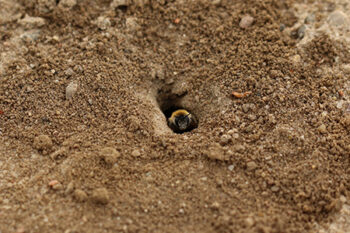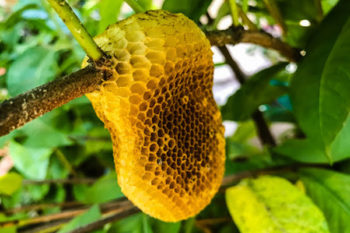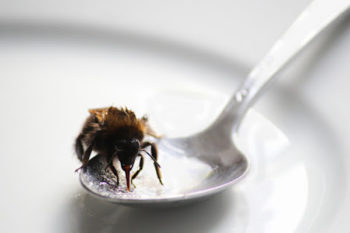
When you see a bee your next thought may be, “Will it sting me?” It’s an instinctual response. No matter how comfortable you are around bees, humans have a deep-seated sense of anxiety about them that’s hard to shake. So with that in mind, the bee control experts at Griffin Pest Solutions will tell you what NOT to do around bees, and share some tips on how to avoid bee stings.
Do Bees Sting for No Reason?
Bees are typically not aggressive and will not usually sting people unless they have a reason. Bees are simple creatures for the most part. They only want a few things: to do their job and to protect their nest. As long as you understand this and let them go about their business, it’s unlikely that they’ll try to sting you.
Need Bee, Wasp & Hornet Pest Control Services?
Why Do Bees Sting?
Bees sting when they feel threatened or feel that the nest is threatened (even if it isn’t). That’s why the best way to reduce your risk of bee stings is to make sure bees don’t feel threatened. Here are seven behaviors that bees may see as threatening. To avoid getting stung by a bee, DON’T DO THESE THINGS:
- Approach a bee’s nest – This one’s obvious, right? If you see a bee’s nest, stay away from that thing! Bees and wasps usually sting to defend themselves and their homes. If you approach a bee’s nest, they could easily interpret you as a threat. If that happens, you don’t have to worry about one or two bees. You’ll have to worry about all the bees. Or you could just give that bee’s nest a wide berth! The right choice seems pretty clear.
 Make sudden movements – Bees usually sting people for one of two reasons, and both of those reasons have to do with feeling threatened. They sting people who either wander too close to their nests… or startle them with sudden movements. If you see bees around you, try not to move too quickly. Don’t jerk toward or away from the bee, freak out, jump up and down, whatever. Instead, move away from the bee sloooooowly. If the bee knows you’re there and you’re not threatening it, it’ll probably leave you alone.
Make sudden movements – Bees usually sting people for one of two reasons, and both of those reasons have to do with feeling threatened. They sting people who either wander too close to their nests… or startle them with sudden movements. If you see bees around you, try not to move too quickly. Don’t jerk toward or away from the bee, freak out, jump up and down, whatever. Instead, move away from the bee sloooooowly. If the bee knows you’re there and you’re not threatening it, it’ll probably leave you alone.- Throw things – This one sort of follows from the first two. Obviously, throwing something constitutes a “sudden movement.” You’ll startle bees with your sudden flying projectile and they’ll sting in retaliation. OR your sudden, flying projectile will collide with a nest. And you’ll have to answer for your crimes. To all the bees. If you see bees or especially a bee’s nest nearby, maybe just refrain from tossing that stone or stick. We get it–throwing things is fun–but “not being stung by a bee” is MORE fun, when you think about it.
- Swat at the bees – It’s a surprisingly hard impulse to control, especially if the bee lands on you. When you see the bee buzzing nearby, something makes you want to slap it away. You should do whatever you can to avoid that impulse. If you lash out at a bee, you can’t exactly blame it for thinking of you as a threat. If the bee feels like you’re not leaving it a choice, it’ll retaliate against your swatting by stinging you. If you see a bee near or even on you, we recommend simply moving away from it slowly.
- Disturb nearby flowers – Pretty much everyone knows bees eat nectar and pollinate flowers. It’s just what they do. Therefore, you’re naturally much more likely to see bees around flowers. Anytime you’re near flowers, expect to see bees. In fact, we recommend keeping bees in mind around flowers, even if you can’t see them. Try not to trample or otherwise push around flowers. Not only is it not very nice to the flowers, but it might also startle a bee you can’t see. Bees tend to feel vulnerable when they’re eating, which may make them more likely to sting.
 Eat or drink sugary foods – If you’ve ever eaten a picnic outside, you probably know that bees are very interested in food and drinks. Bees and wasps are both attracted to simple sugars as a source of easy energy. Soft drinks, candy, alcohol, pastries, fruits, and other sugary foods will attract bees to you. If you startle them during their approach, they’ll sting you in self-defense. If you eating or drinking something sugary outside, do so quickly. Keep your food or drink in a sealable container, and dispose of it as soon as you’re finished. Most importantly, stay aware of your surroundings. The bee you can’t see is more likely to sting you than the one you can see.
Eat or drink sugary foods – If you’ve ever eaten a picnic outside, you probably know that bees are very interested in food and drinks. Bees and wasps are both attracted to simple sugars as a source of easy energy. Soft drinks, candy, alcohol, pastries, fruits, and other sugary foods will attract bees to you. If you startle them during their approach, they’ll sting you in self-defense. If you eating or drinking something sugary outside, do so quickly. Keep your food or drink in a sealable container, and dispose of it as soon as you’re finished. Most importantly, stay aware of your surroundings. The bee you can’t see is more likely to sting you than the one you can see.- Run away – Now, we get that you won’t always be able to help this. If a swarm of bees comes at you, you’ll probably try to get the heck out of there by instinct. The problem is that running away might make you more likely to be stung for a couple of reasons. After all, it’s a sudden movement. If there are any bees near you, you may startle them with your sudden retreat. Bees might also interpret your speed as a threat to their nest, especially if you’re nearby. If you can help it, we always recommend moving away from bees slowly.
Next time you head out to a place where you may see bees, keep these simple guidelines in mind. As long as you don’t disturb them and give them some space, bees will pretty much leave you alone. They’re even less interested in stinging you than you are in being stung, after all.
What to Do If a Bee Is Near You
If a bee or bees get too close, don’t stress. Slowly and calmly walk away from the situation. If you don’t panic and you avoid quick movements, bees are unlikely to see you as any kind of threat and will not go out of your way to sting you.
What Should You Do If You Find Bee Holes on Your Property?
 Most importantly: DO NOT SEAL THE HOLES!
Most importantly: DO NOT SEAL THE HOLES!
Every summer, we get calls from homeowners with the same old story. “A few days ago, I had some bees drilling into the side of my house, so I sprayed them and then sealed up the hole. I thought that would take care of them. Now, I’ve got 1,000 bees in my bedroom and part of my ceiling is on the floor! I didn’t know bees could eat through drywall.”
This is such a common mistake that Griffin Pest Solutions gets these calls a couple hundred times each season from frantic homeowners who can’t even enter their homes.
Attention homeowners! If you see bees, wasps, or yellow jackets going into a small hole in the side of your house or under the eaves, etc… but you can’t see their hive or nest, DO NOT SEAL UP THE HOLE! These insects will find a way out. They are good chewers and the drywall in your home is easy for them to chew through. By plugging up their exit, you force them to look to find another way to escape. That usually forces them to chew their way inside your home and that puts you on the outside.
Be safe. When you encounter something like this, call a professional stinging insect control and removal expert.
What’s the Best Way to Avoid Bee Stings? Reliable Bee Control
Bee stings are a pain, and if they sting someone who’s allergic or immuno-compromised, they can be downright dangerous. At the same time, as long as you give bees space, they’re unlikely to sting you.
Still, sometimes bees on your property are unavoidable. If a bee colony built their home uncomfortably close to you, then you should call Griffin! We’ll take care of the issue so you can get back your peace of mind.
Back to Bee, Wasp, & Hornet Exterminators – Control – Removal

 Make sudden movements
Make sudden movements Eat or drink sugary foods
Eat or drink sugary foods